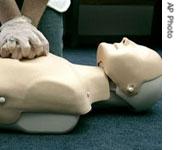VOA慢速英语 2007 0328a
时间:2018-12-07 作者:英语课 分类:VOA慢速英语2007年(三)月
This is the VOA Special English Health Report.

Cardiopulmonary resuscitation 1, or CPR, can save the life of someone whose heart has stopped. The condition is called cardiac arrest. The heart stops pumping blood. The person stops breathing. Without lifesaving measures, the brain starts to die within four to six minutes.
CPR combines breathing into the victim's mouth and repeated presses on the chest. CPR keeps blood and oxygen flowing to the heart and brain.
However, a new Japanese study questions the usefulness of mouth-to-mouth breathing.
The study was published in the British medical magazine, The Lancet. Doctors in Tokyo led the research. It examined more than four thousand people who had suffered cardiac arrest. In all the cases, witnesses saw the event happen.
More than one thousand of the victims received some kind of medical assistance 2 from witnesses. Seven hundred and twelve received CPR. Four hundred and thirty-nine received chest presses only. No mouth-to-mouth rescue breaths were given to them.
The researchers say any kind of CPR improved chances of the patient's survival 3. But, they said those people treated with only chest presses suffered less brain damage. Twenty-two percent survived with good brain ability. Only ten percent of the victims treated with traditional CPR survived with good brain ability.
The American Heart Association 4 changed its guidelines 5 for CPR chest presses in two thousand five. It said people should increase the number of chest presses from fifteen to thirty for every two breaths given.
Gordon Ewy is a heart doctor at the University of Arizona College of Medicine in Tucson. He wrote a report that appeared with the study. Doctor Ewy thinks the CPR guidelines should be changed again. He said the heart association should remove rescue breaths from the guidelines.
He argues that more witnesses to cardiac arrests would provide treatment if rescue breaths are not a part of CPR. He says this would save lives. Studies show that many people do not want to perform mouth-to-mouth breathing on a stranger for fear of getting a disease 6.
Cardiac arrest kills more than three hundred thousand people in the United States every year. The American Heart Association says about ninety-five percent of victims die before they get to a medical center.
And that's the VOA Special English Health Report, written by Caty Weaver 7. I’m Bob Doughty 8.
- Despite attempts at resuscitation,Mr Lynch died a week later in hospital.虽经全力抢救,但林奇先生一周以后还是在医院去世了。
- We gave him mouth-to-mouth resuscitation and heart massage.我们对他进行了口对口复苏救治和心脏按摩。
- She called and called but no one came to her assistance.她叫了又叫,但没有人来帮。
- He will get the great possible assistance.他将获得尽可能大的帮助。
- The doctor told my wife I had a fifty-fifty chance of survival.医生告诉我的妻子,说我活下去的可能性只有50%。
- The old man was a survival of a past age.这位老人是上一代的遗老。
- Our long association with your company has brought great benefits.我方和贵公司的长期合作带来了巨大的利益。
- I broke away from the association ten years ago.我10年前就脱离了那个团体。
- The government has drawn up guidelines on the treatment of the mentally ill. 政府制订了对待精神病人的指导方针。
- Planners seem a little uncomfortable with the current government guidelines. 规划师似乎不太接受现行的政府指道方针。
- The doctors are trying to stamp out the disease.医生正在尽力消灭这种疾病。
- He fought against the disease for a long time.他同疾病做了长时间的斗争。